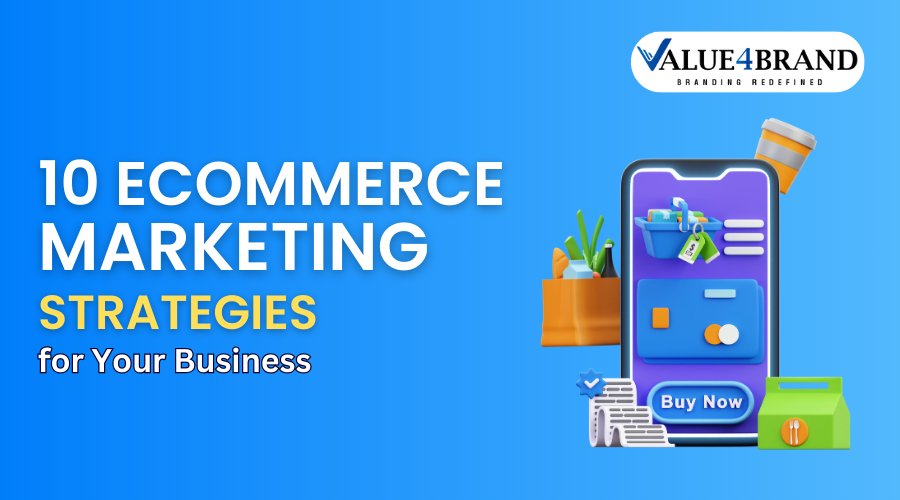Today, the ecommerce industry is booming at a significant pace. Increasing customer base and evolving market have set the stage for brands to harness innovative ways to market their offerings and boost sales. Whether you are an online retailer with a vast customer base or a beginner who has just launched its store, it’s important to stay up to date with the most current ecommerce marketing strategies for your business. Without a clear e-commerce marketing strategy, businesses might face significant challenges to stay competitive.

Reach out to us anytime — we’re just a message away !!
We’d love to hear from you! Whether you have a question, feedback, or just want to say hello, our team is here to help.
Connect With UsThus, it is essential to invest in an effective ecommerce marketing strategy. To help you make the right selection, we have presented the best e-commerce marketing techniques that help take your business to new heights.
Top 10 Ecommerce Marketing Strategies for Your Business
1. Invest in Content Marketing
If you are looking for a strong ROI in your marketing campaign, then you must consider e-commerce content marketing as an important aspect of your e-commerce strategy. Whether you’re creating and posting blogs, articles, videos, or podcasts, creating high-quality content is important to engage more readers. Through content marketing, you can answer your customers’ questions, educate them, and influence them to make future purchases.
Before starting with content marketing, first of all, research your audience requirements and then create the content. Then, create it and boost it with your email marketing campaign or social media channels. Start ranking your content on various search engine portals to get more organic traffic and engage with potential customers to establish long-term relations.
2. Step Up Your Social Media Marketing
In addition to the strong content marketing strategy that helps get more organic traffic, brands engage with their target customers through social media platforms. It is the place where brands can connect with their targeted customers. An important aspect of an e-commerce marketing strategy is finding and reaching your customers where they are most active. Connect with your audience and inform them about upcoming events, product launches, awards and recognition, etc.
Marketing teams must choose the right platforms to manage and distribute this content. For instance, if you target CEOs, directors, sales managers, etc., then you must connect and engage with them through LinkedIn. Marketing teams must know the right platforms used by their customers and align the channels they use with them.
3. Grow Your Email Marketing Campaign
Email marketing is another effective ecommerce marketing strategy through which you can let present and future customers know about new products or information. If marketing teams provide timely and relevant information through this channel, they can close more sales. Providing information about new product releases, discounts, offers, etc., can engage more customers.
Once businesses have prepared the list of customers’ email addresses, they must send relevant and timely emails to stay in contact with leads. Example emails include welcome emails, sales notices, exclusive offers, birthday celebrations, order confirmations, product launches and updates, newsletters, etc. Give a personalized touch to your email marketing campaign by using the customer’s name whenever possible and referencing specific products they’ve shown an interest in.
Also Read: How to Set up a Google Business Profile for Small Businesses
4. Adopt a Pay-per-Click Strategy
Digital pay-per-click (PPC) advertising includes the ads that send users straight to your landing page. The ads appear on several platforms, but Google and Facebook are some of the most popular platforms. PPR strategies ensure that product pages are at the top of SERPs in the form of ads. In the case of Google PPC ads, the ads will be available at the top of the search results, so if you sell sports accessories and someone searches “best sports accessories,” your ad will be displayed at the top of the search engine results page (SERP).
Good PPC campaigns include an ad, offer and landing page. This approach supports SEO efforts and lets businesses use marketing budgets to make offers accessible to consumers.
5. Invest in SEO
Having a website plays an important role in targeting online customers. However, websites aren’t enough for consumers to easily find the brand, so to improve its visibility, marketing teams must focus on search engine optimization (SEO) as well. The marketing team must update the websites with valuable and accurate content. Since the majority of the purchases are made online today, the sites with good SEO rank higher. Also, research has shown that the sites ranking higher have a nearly 40% click-through rate (CTR), while the third only generates 10.2%.
An SEO strategy helps organizations ensure their content becomes more visible on various search engine results pages (SERPs) for relevant queries and delivers positive results when customers find the information they need.
6. Re-engage with Customers via Retargeting
Along with a PPC strategy, a retargeting strategy is another paid approach to urge customers to revisit the website that they have already visited and shown some interest in the past. While PPC can bring new eyes to a website, retargeting tracks people who have already visited your website earlier but left without making a purchase. Marketers can send emails or text messages encouraging people to complete the transaction. Remind them that their shortlisted product is still on the cart list and waiting to be purchased.
7. Customer Loyalty Programs
Customer loyalty programs, another e-commerce marketing strategy, help boost revenue and retain customers for a long time. Loyal customers are highly valuable since they have already purchased in the past. If businesses motivate existing customers with loyalty programs and repeat purchases, they can increase CLV and create strong brand advocates. The businesses can use a loyalty program to offer incentives for purchases or referrals.
For example, for every INR 500 members spend, they earn an INR 50 off coupon code or offer 10% off on their next purchase. These are some of how you can increase customers’ trust in your brand. Many businesses also introduce referral programs to motivate customers for future purchases.
8. Influencer Marketing
The rise of social media has resulted in a surge in influencer marketing. Influencer marketing is a growing strategy among various brands that want to target specific audiences through influencers they trust the most. Influencers cater to diversified audiences; from tech review blogs and YouTube channels to apparel products and TikTok channels, brands connect with different can reach their followers.
Since influencers have thousands of followers, they can easily connect with the audiences of your niche. The most common social media channels for an influencer marketing campaign differ based on the age of your audience, but the most popular are Instagram, YouTube, TikTok, Facebook, etc.
9. SMS Marketing
SMS texting is a resurging and growing channel for ecommerce marketing strategies and can do wonders in improving sales. By using the combination of various strategies including creating relevant content, sending emails, and promoting through paid channels, social media or influencers, marketing teams must not ignore the significance of SMS marketing.
Brands can leverage the power of SMS marketing strategy and can inform both prospects and new customers about upcoming offers, deals, etc. Optimize SMS strategy by experimenting with various messaging styles and incentives. Consider it as a second chance to close the deal with customers who are already halfway there.
Also Read: Hotel Digital Marketing Strategies to Maximize Your Bookings
10. Optimize for Mobile
Today the majority of the traffic to eCommerce websites comes from mobile, which means, optimizing an eCommerce website for mobile is crucial than ever before and thus is an important ecommerce marketing strategy. The marketers must provide a good UX for everyone and make sure the website is highly responsive and looks good on every screen layout. Also, the website must have a fast loading time as users expect to have a good experience.
Make sure all crucial website elements are available and are working smoothly on mobile.
Boost Your Marketing Strategy by Connecting with the Best Ecommerce SEO Agency in Delhi.
Staying updated with the latest marketing strategies and techniques is important for any successful eCommerce website. The target audience expects relevant, engaging, and valuable content and products that truly meet their expectations. If your e-commerce marketing strategy depends on content marketing, SEO, PPC, or any other, it’s better to collaborate with the best ecommerce SEO company in Delhi that can take your business to the next level.
Whether you’re a well-established brand or have just started, contact the experts to see the results.



